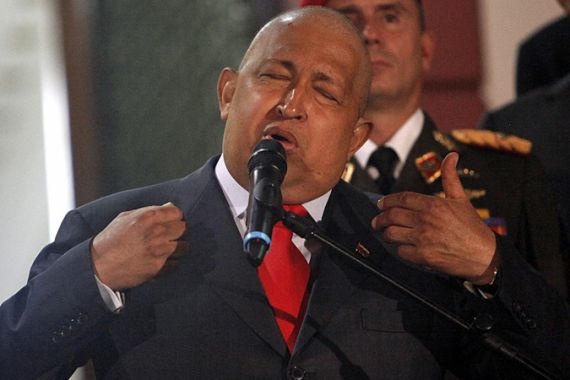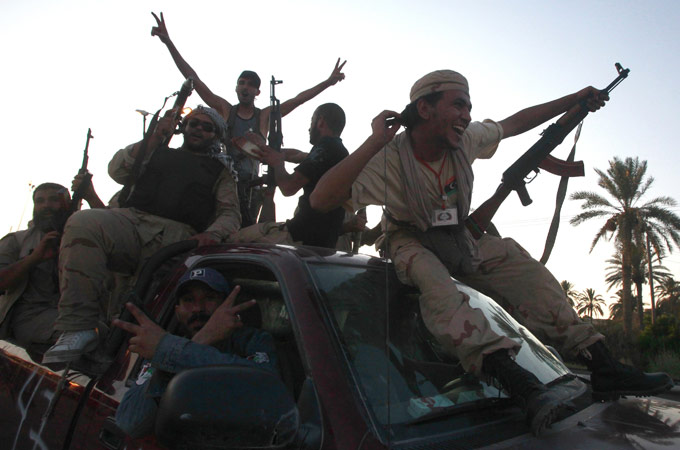World leaders react to advance on Tripoli
Egypt recognises opposition as Libya’s governing force, while Venezuela’s Chavez condemns foreign support for rebels.

 |
| World leaders have urged Gaddafi to step down in order to avoid further bloodshed [Reuters] |
International leaders have urged Muammar Gaddafi to concede defeat in his battle to hold on to power in Libya, as scenes of celebration broke out in central Tripoli after rebels advanced into the heart of the capital.
On Monday, Egypt recognised Libya’s National Transitional Council (NTC) as the country’s legitimate governing force, as fighters closed in on Gaddafi’s Tripoli compound, Mohammed Amr, Egypt’s foreign minister, said.
“It pleases me at this historical occasion to announce that Egypt recognises the new regime in Libya and the National Transitional Council that represents it,” he said at a joint news conference with Abdel Moneim al-Huweini, the rebel envoy to Cairo and the Arab League.
Amr said his government would hand over the office of Libya’s Arab League representative and the Cairo embassy to al-Huweini.
His announcement came hours after the Arab League expressed its full solidarity with the rebel government but stopped short of recognising the NTC, which is led by Mustafa Abdel Jalil, Gaddafi’s ex-justice minister.
‘Degree of uncertainty’
In the US, Barack Obama gave support to rebel forces and their achievements thus far, calling their movement a “basic and joyful longing for human freedom”.
Obama also emphasised that the NTC battle has not ended.
“The situation is still very fluid. There remains a degree of uncertainty and there are still regime elements who pose a threat,” he said in an audio statement on Monday.
“But this much is clear: The Gaddafi regime is coming to an end and the future of Libya is in the hands of its people.”
In a warning to Libyan opposition forces against targeting regime loyalists, Obama said: “True justice will not come from reprisals and violence; it will come from reconciliation and a Libya that allows its citizens to determine their own destiny.
“In that effort, the United States will be a friend and a partner,” he said, vowing to meet the country’s humanitarian needs with “critical supplies” and ultimately support the emerging government with Gaddafi’s frozen assets.
But Hugo Chavez, the Venezuelan president who has frequently expressed support for Gaddafi, condemned US, European and NATO support for the Libyan opposition, which have backed rebels by enforcing a no-fly zone over Libya and launching hundreds of air strikes against Gaddafi’s forces.
|
|
“Today we are seeing images of how the democratic European governments – well some of them are [democratic], we know who they are – are practically demolishing Tripoli with their bombs and the supposedly democratic government of the United States, because they feel like it,” he said.
“Today they dropped – I don’t know how many – bombs, and they are dropping them indiscriminately and openly and they are not explaining anything, over schools, hospitals, houses, businesses, factories, farms. This is happening right now.”
“Let’s pray to God for the Libyan people,” he said.
Not unlike Gaddafi’s strong rhetoric on global security, Chavez maintains an open anti-imperialist stance and regularly condemns foreign interventions on sovereign soil.
Foreign support ‘necessary and right’
In the UK, British Prime Minister David Cameron said that the transition in Libya must be led by Libyans, although his country has given regular foreign support for Libyan opposition forces. He also said Gaddafi must stop fighting, and that his fate will be decided on by the Libyan rebel council.
“What we have done in Libya is necessary, legal and right,” Cameron said.
The prime minister, who was on a holiday in Cornwall, returned to London on Monday to chair a meeting of the National Security Council on Libya. Alistair Burt, the British foreign minister, stressed that the preservation of civil order was a foremost priority.
South Africa, meanwhile, has denied reports that it would facilitate Gaddafi’s exit from Libya.
Maite Nkoana-Mashabane, the South African international relations and co-operation minister, told a press conference in Johannesburg that her government did not know Gaddafi’s whereabouts but that it knew “for sure he would not ask to come here”.
She said that no South African aircraft had landed in Libya, and that the only evacuation aircraft had landed in Tunisia, where they allowed diplomats and South African nationals a way to return home.
Nkoana-Mashabane reiterated South Africa’s commitment to an African Union roadmap for peace, which she said “should be given space to help the people of Libya to help themselves …. when the dust settles”.
High level meetings of the AU will be held on August 25 and 26 to discuss the situation in Libya.
‘New beginning’
The European Union, meanwhile, said that it was preparing for a post-Gaddafi Libya.
“We seem to be witnessing the last moments of the Gaddafi regime and we call on Gaddafi to step down without further delay and avoid further bloodshed,” Michael Mann, a spokesman for EU foreign affairs chief Catherine Ashton, said on Monday.
“We have post-Gaddafi planning going on … we do have a number of scenarios that we have worked in terms of our assistance post-Gaddafi,” he said.
Anders Fogh Rasmussen, the NATO secretary-general, said that it was clear that Gaddafi’s government was crumbling.
“The sooner Gaddafi realises that he cannot win the battle against his own people, the better – so that the Libyan people can be spared further bloodshed and suffering.”
“The Libyan people have suffered tremendously under Gaddafi’s rule for four decades. Now they have a chance for a new beginning. Now is the time for all threats against civilians to stop, as the United Nations Security Council demanded.
“Now is the time to create a new Libya – a state based on freedom, not fear; democracy, not dictatorship; the will of the many, not the whims of a few.”
Nicolas Sarkozy, the French president, saluted the courage of the rebels as they battled it out on the streets of Tripoli, and reassured them of France’s support for the liberation of their country from what he termed “oppression” and “dictator[ship]”.
He also urged Gaddafi to “spare his people of further suffering” and to lay down his arms and surrender.
Franco Frattini, the Italian foreign minister, said that “time has run out” for Gaddafi, and that he controls “not more than 10-15 per cent” of the country.
Hamas also welcomed the entry of rebel troops into Tripoli.
“We hope this will represent a turning point in the history of Libya towards progress and prosperity in implementing the will of the Libyan people,” said Sami Abu Zuhri, a Hamas spokesman.
Tunisia, Libya’s neighbour to the west, expressed support for the rebel-led National Transitional Council.
China’s foreign ministry said on Monday that it respected the choice of Libyan people and hoped that the situation there would stabilise soon.